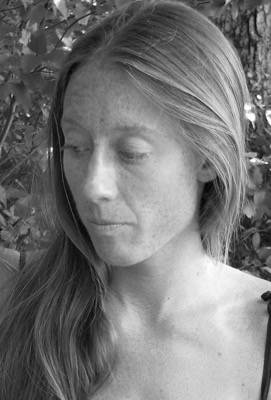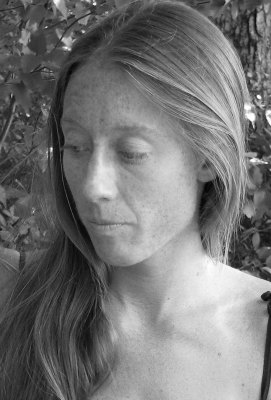
Megan Grumbling
Poetry
Megan Grumbling’s Vassar Miller Prize-winning poetry collection, Booker’s Point, is forthcoming from the University of Texas Press in spring of 2016. Her work has appeared in Poetry, The Iowa Review, Crazyhorse, Memorious, and other journals, and awarded the Ruth Lilly Fellowship, Robert Frost Award, and St. Boltoph Emerging Artist Award. She is the librettist and co-creator, with composer Denis Nye, of the Hinge/Works opera Persephone in the Late Anthropocene, which will premiere in the spring of 2016, in Portland, Maine.
Persephone’s Blues Song
Slate-blue, bruised cobalt. Worse than the usual
solemnities, the chilled goblet and robe.
Nightshade and coal. Cold sentences
of cannot.
The blues leave blind spots.
Somewhere between the blue of need
and the blue of want, my eyes cease
to adjust. To abide my milk-blue cast
in the glass.
The blues send me above for a dose
of solace. Robin’s egg and gold.
Summer freckles, honey and rose.
This town’s ever warmer harbor
nearly green.
The blues beg bright things freed.
Larkspur in my brow, lemon
in my blonde. Inklings far too fair
and far too fleet to be kept
in the dark.
“ ‘Persephone’s Blues Song’ is from the dual manuscript and libretto Persephone in the Late Anthropocene, which re-imagines the classical myth of Persephone in the age of climate change and industrial agriculture. In ‘Blues Song,’ Persephone muses on her rationalizations for more often ascending from the underworld.
The opera Persephone in the Late Anthropocene, co-created with composer Denis Nye for Hinge/Works, will premiere in the spring of 2016 in Portland, Maine, at SPACE Gallery. ”
Persephone’s Winter Feast Song
of pea shoot, corn furl. Now, I gorge.
Torpor, tumor. Pods and ears
by the trough.
Lately I long only to feast
on bowls of stones, spoons of light. I starve
for dark. For starving. Our revels now
are endless.
At picnics, I can taste dwarf lumps and cleft
tassels in the Xtra Sweet. Dopamine.
Cobalt and ultraviolet.
Split atoms
that shriveled and sugar-cured the seed.
My mother’s meals turn shame into starch.
Each raw ear leaks a milk so sweet
it scours.
“ ‘Persephone’s Winter Feast Song’ is from the dual manuscript and libretto Persephone in the Late Anthropocene, which re-imagines the classical myth of Persephone in the age of climate change and industrial agriculture. In ‘Winter Feast Song,’ Persephone laments the queasy excess of certain new rituals.
The opera Persephone in the Late Anthropocene, co-created with composer Denis Nye for Hinge/Works, will premiere in the spring of 2016 in Portland, Maine, at SPACE Gallery. ”

Megan Grumbling
Poetry
Megan Grumbling’s work has appeared in Poetry, The Iowa Review, Crazyhorse, The Southern Review, and other journals; and she has been awarded the Poetry Foundation’s Ruth Lilly Fellowship and the Robert Frost Foundation’s Award for Poetry. She teaches at the University of New England and Southern Maine Community College, serves as reviews editor for the poetry and arts journal The Café Review, and is a theater critic for the Portland Phoenix.
Vapors
of it diffuse: You, gaseous somewhere. Breath
is loss; confess: A palm before my face
grows damp with gone. It’s maybe in the wet
of some man’s retina, the water runs
once it has left, or in the perfect beads,
late mornings, warm brown bread with cinnamon
leaves on a cobalt glaze. The pristine weep
of this iced gin I’ll drain, I praise—a flow
through pirates, dodos, dinosaurs, all pores
perspiring steam soon you, soon us. And so
it goes, just borrowed. So the haunting, pour
or frost, is fluid as the thirst you’d slake,
a need now clear, now prism, now opaque.
“ Probably the closest thing to ‘ghosts’ I have encountered is in the seemingly infinite life of water: in both its endless passing, one vessel to the next, and in how its so various forms—cold sea beading on skin, the certain blue of the sky in a sultry place—can so viscerally bring gone things back into the body. The poem ‘Vapors’ finds me taking deep comfort in such spirits. ”
